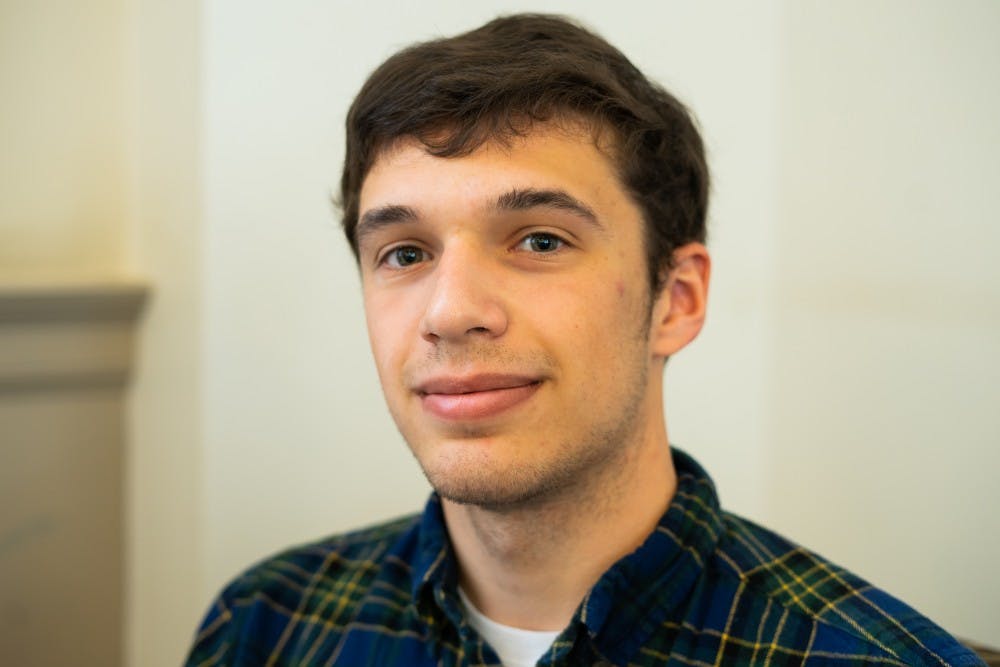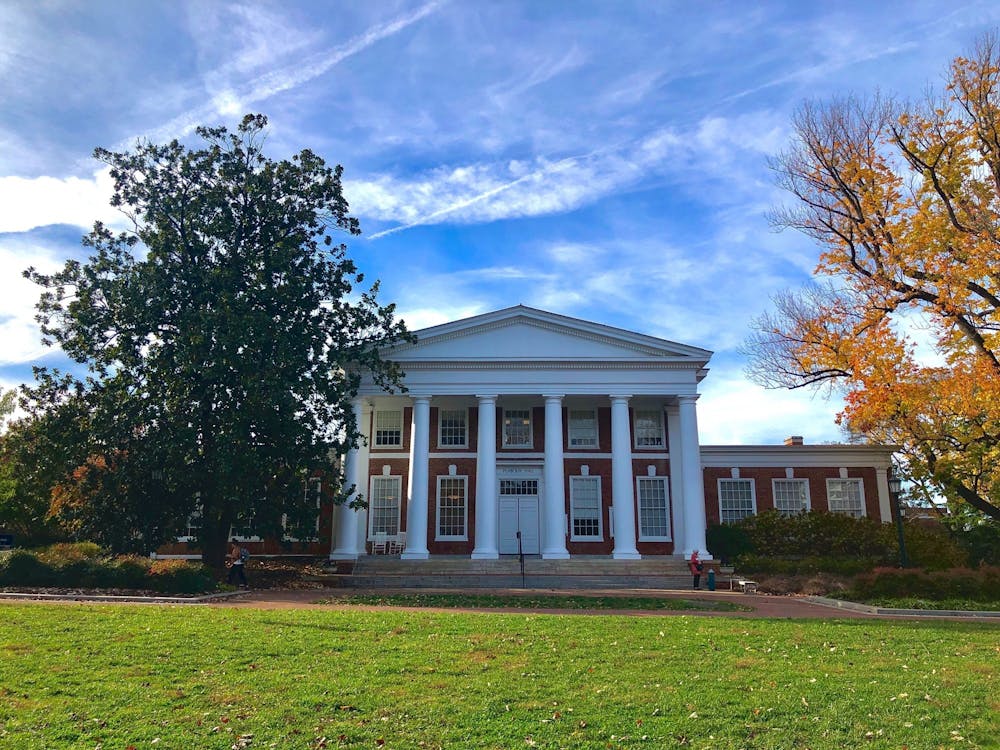At the University, the five member Native American Student Union has taken on the difficult task of representing their ethnic group and addressing cultural appropriation that has taken place at both the state level and within the University community in the past couple of weeks.
“Right now we're pretty small in terms of actual numbers and membership,” Anthony Malabad, third-year College student and NASU president, said. “However we are, in the rules, very inclusive. You don't have to be Native to join. It's just open to Native students, allies — really anyone who's interested in the culture and learning more about Native community and Native issues.”
NASU core members task themselves with fighting for the rights of and organizing events for students from indigenous backgrounds at the University. Their recruitment actively targets mainly students who self-identify as being of Native American heritage when they apply but is open to all students.
In 2018, 19 individuals or 0.12 percent of the University’s overall undergraduate student population identified as Native American or Alaskan — indicating lower enrollment from 2009, when 26 individuals identified as Native American or Alaskan and represented 0.18 percent of the undergraduate student body. Currently, 16 individuals who identify as Native American or Alaskan are in the College, while two are in Engineering and one is in Commerce. Since 2009, there have been no students who identify as Native American or Alaskan in Batten, Architecture or Curry.
“We do partner with Multicultural Student Services — they give us a list of incoming first years who identified Native on the ... [self-reported demographic data on SIS] coming in, and we reach out to them through email,” Malabad said. “We also are at the activities fair and at a lot of events at the very beginning of the year that Multicultural Students Center puts on.”
Second-year College student and vice president of NASU, Fernanda Yepez-Lopez, is the organization’s representative to the Minority Rights Coalition. She is also one of the University’s 19 students who identifies as Native American this year. Yepez-Lopez said she got involved in NASU her first year because of outreach efforts by the University and credits the community with bringing attention to incidents on Grounds that are often overlooked.
“If I wasn't involved in the [NASU] community there are a lot of things that I wouldn't find out,” Yepez-Lopez said. “People who are hurt within the [NASU] community don’t necessarily want to talk about it with people who are not from that community, and obviously the people who are oppressing might not know that they're oppressing or don't want to acknowledge it. So a lot of people are left out of the loop of what it's like to be a minority community at UVA.”
In light of recent events, such as the confrontation caught on video Jan. 20 between a Native American activist Nathan Phillips and students from Kentucky’s Coventry Catholic High School in Washington D.C — where the students mocked Phillips — Malabad has seen the organization shift into a role as an advocate for Native Americans, both individually and through partnerships with other organizations in the Minority Rights Coalition.
“I think definitely since I've been here we've stepped up into a more of an advocacy role and partner, done a lot more partnerships with BSA and LSA and other organizations through the MRC, the Minority Rights Coalition, sort of in response to things that happen, [such as] August 2017, but also we're involved with sort of political issues that affect the different marginalized communities within Minority Rights Coalition and sort of help them out in terms of volunteering in terms of promotion for their campaigns,” Malabad said.
According to Yepez-Lopez, minority groups around Grounds often rely on one another for support and information, particularly through the Minority Rights Coalition.
“If something happens to one of the other groups that's in the Minority Rights Coalition, we usually find out,” Yepez-Lopez said. “As soon as Anthony and I learned about the incident with the [Kappa Sigma bid day] pictures, we told the Minority Rights Coalition right away. They do the same for for whenever something happens to them. So it's a very interconnected community. Like we all struggle in different ways, but there’s no hierarchy in that suffering.”
When images surfaced on Instagram and Twitter Feb. 3 showing multiple men of the Kappa Sigma fraternity in a case of what appeared to be cultural appropriation as they donned Native American attire on fraternity bid day, NASU’s role in advocacy kicked into gear in response. In addition, several Zeta Tau Alpha women were criticized for wearing sombreros and holding maracas as part of chapter-sponsored big-little reveals in a social media post that has since been deleted.
Two days after the incident, NASU posted a statement on Facebook in response to the events and called the specific incident at the fraternity both “incredibly disrespectful” and an act of “blatant racism.”
“To the community, we ask that you show your support by getting educated on cultural appropriation and the history behind ethnic groups’ traditions,” the statement said. “The true travesty in this situation is that these two students are not alone in their ignorance.”
Along with their statement on Facebook, NASU have been planning a series of events and outreach programs aimed at educating the IFC and ISC about cultural appropriation, starting with the open letter released Feb. 15, entitled “Not Your Costume.”
The criticism of the photographs that emerged on social media underscored the racial dynamics of the University’s Greek system. Inter-Fraternity Council and Inter-Sorority Council chapters at the University are often predominantly white, and the photos symbolize what some people view to be a system unwelcoming to minority students.
The IFC released a statement later that evening condemning the actions of Kappa Sigma fraternity members during IFC bid day events. The statement described the attire as “prejudiced and culturally insensitive,” also labeling the actions as a form of cultural appropriation. The IFC also said it would work with the University and Kappa Sigma leadership to further investigate the actions depicted in the photo.
“The president of the chapter of Kappa Sigma reached out to me directly and apologized and he said that he's looking forward to meeting with me and with NASU … to apologize in person, but to also work with initiatives going forward and to sort of open a dialogue, which I think will be good for both of our communities,” Malabad said.
In the letter, NASU called on the University’s Office of Fraternity and Sorority Life, the Inter-Fraternity Council and the Inter-Sorority Council for more accountability by the fraternities and sororities in their own constitutions and their relationships with the University, including “increased investment in the education of the history of racism in Greek life and a commitment to increasing the accessibility of Greek life to students in marginalized communities,” according to the letter.
“We're sort of creating [a] campaign about cultural appropriation that's supposed to be getting off the ground, actually within the next day or two, because cultural appropriation isn't just an issue that affects the Native community, it’s something that affects all minority communities, and as we have shown recently, it's been going on for a long time,” Malabad said.
The letter points to the current controversies over blackface and appropriation as proof of the practices that have existed at the University since the 1800s and lingered into the present.
“[The acts of appropriation] lack the respect of traditional cultural heritage and history, as well as the consent from these communities before embracing sacred aspects of their cultures,” NASU said in the open letter. “In these acts, there is no acknowledgment of the violence and struggle that our communities have had to suffer in order to continue practicing our traditions. Our heritage is not a costume. Our cultures should never be trivialized or minimized.”
Various student organizations, such as the Latinx Student Alliance, Organization of Young Filipino Americans, Queer Student Union, Asian Leaders Council and the Black Student Alliance have signed the letter in solidarity with NASU.
NASU has organized events that celebrate Indigenous culture in the University community and Charlottesville, including an annual pow wow held on Grounds and plans to host a major upcoming event in partnership with the Kluge-Ruhe Museum of Aboriginal Art at the University. The Kluge-Ruhe Aboriginal Art Collection is, according to the museum’s website, “the only museum outside of Australia dedicated to the exhibition and study of Indigenous Australian art.”
The group’s first annual pow wow has held in 2015, but in 2018, the pow wow was canceled for unspecified reasons, according to a Facebook post by NASU.
“Since NASU is a small organization, we have to focus on some things,” Yepez-Lopez said.
“This year we decided not to do the pow wow, so we have been able to take time to tackle the issues that are surfacing now.”
NASU is planning multiple major events in the next year open to the entire University community, but their low membership may pose a problem, Malabad said. Much of their event advertising is done through their Facebook page.
“In April, we have a large event that we're going to be putting on with Kluge-Ruhe, the Aboriginal Art Museum that's over by Pantops,” Malabad said. “So we're working on them on sort of a celebration of Native cultures from Australia and the United States and other places as well… That’s in April of this year. Next year we're hoping to put on the pow wow again. But we're going to see if we're going to need more membership to do that because that's quite a large task, especially if we're doing it ourselves.”






